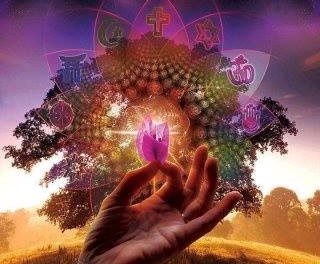Progressive Christianity and the Baha’i faith? Q and A

Question
Hello,
My name is Dave. I am a pastoral intern at a Lutheran church in Minnesota. The congregation is currently looking at the “study guide for the 8 points.” I was wondering however, what the separation between Progressive Christianity and the Baha’i faith is, if any. I have only just finished reading the study guide, and though I don’t agree with all of the tenants set forth, it is a very interesting concept. It just seems very similar to the Baha’i faith, and how different it is even from the standpoint of a Liberal Lutheran denomination.
Answer
Dave,
Thanks for writing. You ask an interesting question and frankly it is one that we get frequently. The only differences are that variety of names for religions are placed in the same question. That is, instead of Baha’i it might be Buddhism or Hinduism, Sufism, or Unity or Church of Religious Science. It is my personal conclusions that all of these traditions have a great deal in common in their basic beliefs, though they often have subtle differences. Why are they so similar? Because the teachings are based on the real, mystical experiences of real individuals who I would suggest are connecting with the same Source. The historical and cultural settings may have influenced some of these minor differences. And yes there are major differences in the case of Fourth Century Christianity.
When Christianity became a critical part of the Roman Empire power structure, it went from a religion of a powerless minority to a religion for the powerful. It became a tool of the Empire. Instead of a path, a kerygma that could lead one to an experience of the connectedness of all life, it became a divisive and at times even corrosive tool of the powerful…or those who wanted to be powerful. How did it do that? By creating a structural hierarchy and a belief system that insisted that there was only one way to interpret the Jesus story. It gave the church and the privileged few the keys to eternal life.One had to believe that Jesus was God and was sacrificed for the sins of the world or they would be ostracized, imprisoned and even killed. Rather than promoting a compassionate way to live together in harmony, it became the division between the righteous and the fallen. It became the decisive judgment between good and evil.
Rather than recognizing that Jesus was teaching a way to experience the Source, the Infinite Mystery, The Holly Other, G_d, it focused on the rules and beliefs that were all about what happens when we die. Rather than a tool to help a follower awake to a new way of experiencing life, it provided a way to judge and condemn. Rather than interpreting Jesus teachings as a path of love, it was turned into a path of fear.
I am convinced that this is not what Jesus was teaching nor was it how Christianity started. It is our sincere belief that there is no scholarly support or room for the brutal, blood sacrifice of a godson for the sins of the world. The whole sacrificial lamb idea was a manipulative mistake, done for all of the wrong reasons. I would be happy to direct you to several well written books on this subject that might help you at least understand this perspective.
So yes, there are many similarities between religions because the spiritual leaders who inspired these religions expressions had similar mystical experiences. We are convinced that most of these “enlightened teachers” were attempting to help others have the same experience they had. So you may want to know, why Jesus or Christianity? Largely because most of us in this movement have a deep affinity for Jesus the man, and we are more familiar with the setting out of which his teachings were derived. We believe that because of our history, culture, and our training, we can be a little more accurate about what Jesus was teaching than we might be with Mohamed or by Bahá’u’lláh of 19th-century Persia. Frankly it actually gives us hope that we are on the right track when we do find significant similarities among the great mystics. For me personally, this suggests that our interpretation of the Jesus story is getting closer to the truth.
It might be helpful for you to understand that the progressive Christian movement started over well over thirty years ago. The first fifteen years was largely a period of Christian deconstructionism that was being carried out by scholars and theologians all over the world. At the end of that period many of them were asking “Is there anything left?” With the help of a wonderful stable of excellent scholars, theologians and seasoned clergy, our organization has been focused on answering that question for the last twenty years. And it is our belief that there is a great deal left and it holds an important message for the world, as well as individuals. It is a message we believe the world could sorely use today, possibly more than ever. Part of that message is the recognition that none of the great teachers, intended to start a new religion. They were first and foremost teaching individuals or small groups a way that we all might become awake to the awesome, incredible, interconnected universe we share. When we stop worrying about whose religion is the right one, or whose beliefs are the correct ones and start focusing on how to live our lives with compassion and kindness, we will have learned a big part of the teachings of all of these great teachers.
Thanks again for your question. It is a good one. If you are interested in any book suggestions let me know.
Warmly,
Fred
